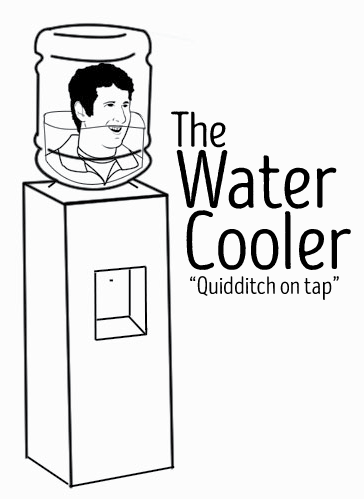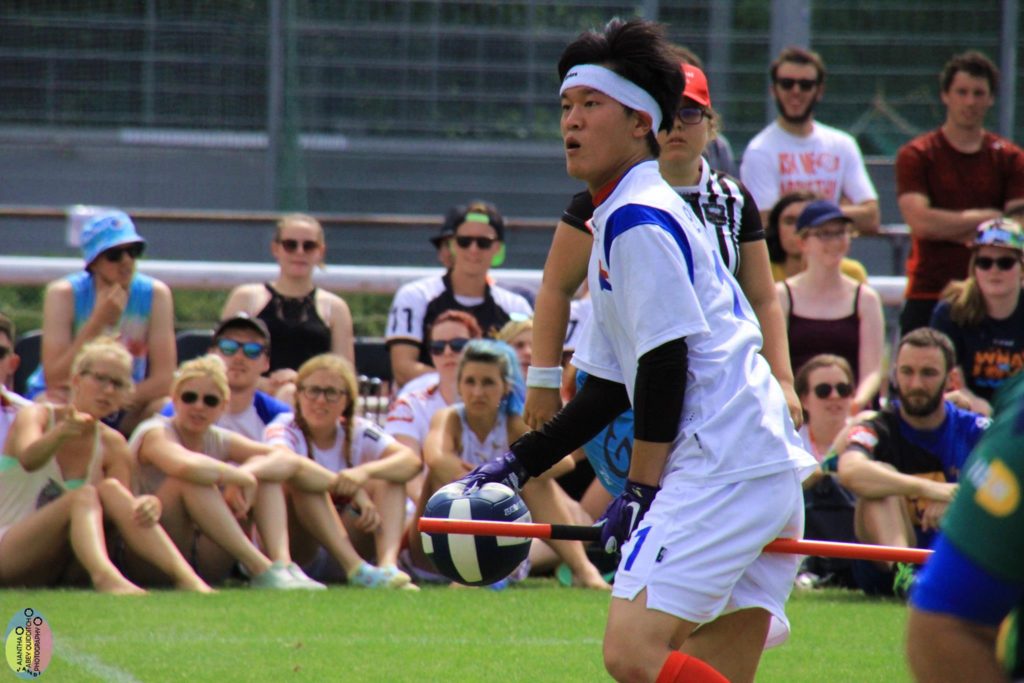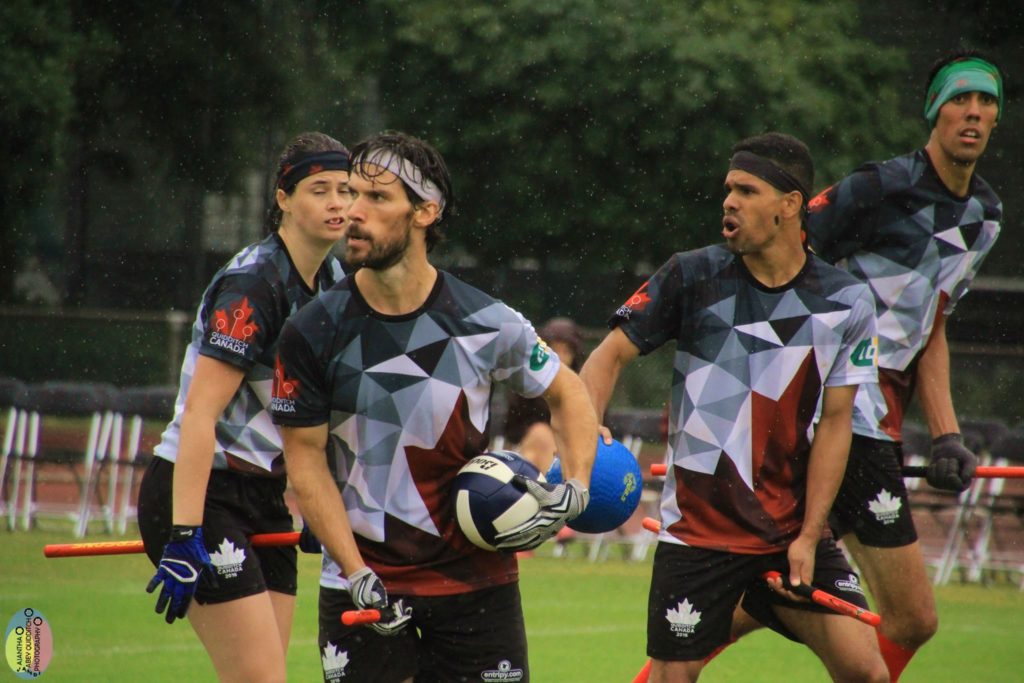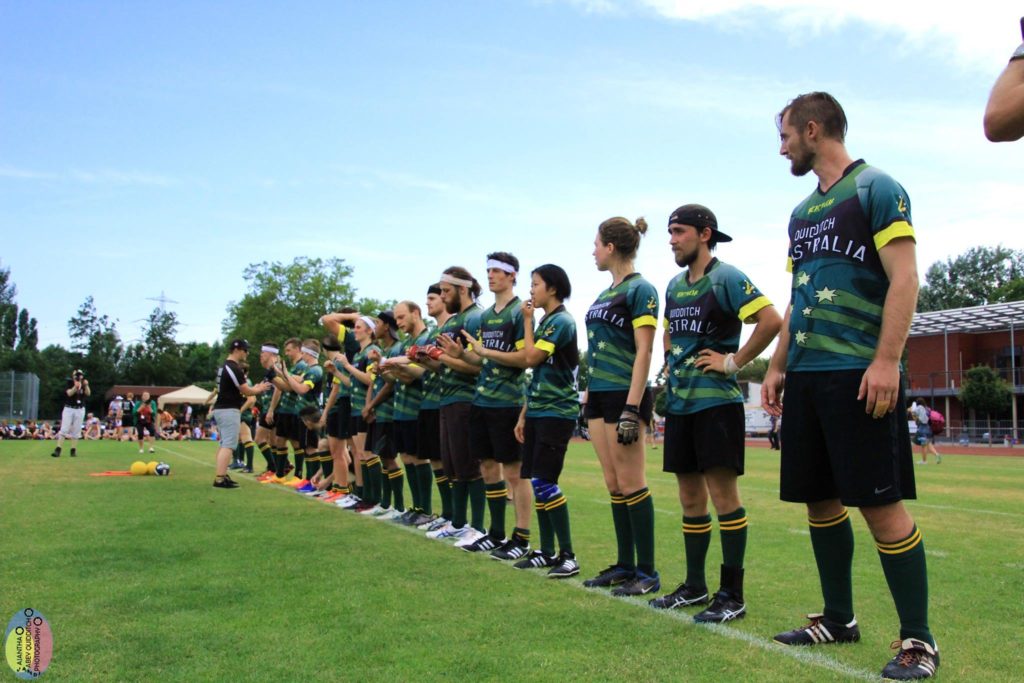- Rule, Britannia, no more?
- Unpopular Opinions: US Quadball Cup 2023
- Proven Contenders: University of Virginia
- Proven Contenders: Rutgers University
- Proven Contenders: University of Michigan
- Proven Contenders: Creighton University
- Different Perspectives: A Look Inside USA Ultimate
- Antwerp QC, Much of Belgian Core, Leaves Competitive Quidditch
Water Cooler: An International Disappointment
- By Ethan Sturm
- Updated: July 23, 2016

Credit: Madison Seale, Nick May, Abbi Pittman
If the different time zones didn’t put you to sleep during day one of the 2016 World Cup, the gameplay probably did. For those that tuned in for all of the matches, they were treated to a series of humdrum blowouts with little variation, innovation or excitement to speak of. The most drama the tournament saw was the status of the top five teams’ point differentials—and when your sporting event’s most engaging aspect is math, you’re doing something seriously wrong.
But a series of exciting late-round matches await us tomorrow, so let’s get day one out of the way so we can put it behind us and move on to more engaging play.
Formatting Errors
The writing was on the wall for the use of a standard pool play to bracket play format at World Cup, since the European Games painted a very clear picture of just how uncompetitive the games would be. Articles were written pitching far more competitive and safe alternatives. Some teams registered with barely large enough rosters, while others planned to bring the best players in the world.
But, despite all of that, the IQA refused to relent and locked themselves into the sport’s most idiotically overused format. Unsurprisingly, the results were horrific and, at times, bordering on cruel. Just two of the 34 games on Saturday were in snitch range, which was one less than the first 34 games of European Games 2015, the prior pole bearer for format insufficiency. Turkey was forced to purposefully drag a game out against the South Korean team that was at times down to three players, refusing to catch in order to maximize point differentials for seeding. Instead of seeing each other in matches, the top teams faced off in complex math formulas and avoidance of suicide snitch grabs. The only drama as the sun set was the exact details of the seed tie-breaking formula since Team USA has been forced off the first seed line by a suicide grab in a game they still maxed out point differential in.

Credit: Ajantha Abey Quidditch Photography
It’s easy to just shake your head and throw out a passive aggressive comment when a poor decision is made in quidditch, but that is not enough here. There was willful negligence in the IQA’s actions—they had evidence of exactly what this format would bring—and they owe their players, their fans and their volunteers an apology. They need to apologize to the fans who tuned in with passion only to see total blowouts on the field. They need to apologize to the South Korean team they eagerly welcomed and then left to the sharks with an asinine format that forced the top teams not just to beat them, but to wipe them off the map. They need to apologize to the players that paid thousands of dollars to travel across the world just to play games with such skewed results that they are worth nothing—all while teams at their skill level play on the other fields. And, most of all, they need to apologize to the quidditch community at large for taking the sport’s biggest international tournament—it’s biggest chance to make a mark on the international media and expand—and for making it an uncompetitive, uninteresting and unsafe snoozefest.
When USQ switched its national championship format to Swiss in 2015 and there were complaints, the switch back to pool play was rapid—because going back to what we are used to is easy, and grasping new ideas is far more difficult. But the easy route has gone too far, and it is absolutely time for us to take action. We need to demand that the IQA apologizes for its actions, explains its actions and promises to not repeat those actions in the future. Another tournament like this is beyond unacceptable.
Strategic Absence
Part of what contributed to the lackluster nature of the play today was a lack of sound underdog strategy from outmatched teams. It’s been over two years now since the term “Kansas-ing” was coined at World Cup VII and almost exactly two years since the United Kingdom tried similar tactics in their Global Games matchup with Team USA. While rule changes and better counter tactics have made slowing down the pace more difficult, it can still be a very effective tactic—as shown by the Los Angeles Gambits use of it in games against Lone Star Quidditch Club over the past two seasons.
For teams not comfortable dragging out the pace of a game, other underdog tactics have arisen. Two-male beater sets are often used as an attempt to gain an edge in the beater game to make up for a shortcoming in the quaffle game. The strategy is so effective that two-male beater sets became almost ubiquitous in the USQ Northeast Region, and, just three months ago, the entirety of the US Quidditch Cup final was played in two-male beater sets on both sides of the pitch.
Unfortunately, despite the chasmic divides in skill often present on pitches today, very little of these tactics were utilized. When Italy took advantage of France’s slow start to grab a lead and hold onto it even for some time beyond that, Italy could have easily slowed the pace. This would have dared France to be aggressive enough to get themselves out of range, opening defensive gaps in the process. Instead, Italy regularly charged down the field, ending offensive possessions in 10 seconds or less, and leaving France plenty of time to get into a groove and put the game away.
The two-male beater set also rarely saw the light of day. Ireland employed it for the first half of their game against Belgium and were only down 50-20 when they subbed out of it. The Belgians immediately took advantage and the score was 90-20 faster than you could blink. Italy also tried the set in the aforementioned game against France, and while the results were undoubtedly more mixed, it wouldn’t have hurt them to try another look.
Obviously several of these national teams don’t have many chances to play together prior to the tournament, and, just like in international soccer, the strategy and execution has fallen behind that of the club game. But neither slow play nor two-male beater sets require much drilling to apply and should be familiar to most modern players. That said, every team was always a lock to make bracket play, so perhaps some countries chose to keep their cards close to their chest, choosing to save such tactics for when there are actual stakes on the matches. Either way, we’ll have a clearer picture tomorrow.
Checking In at the Top
The five Pot One teams all took care of business today, winning every match out of snitch range. It seems almost guaranteed that the three teams on the podium tomorrow will come from that group. So let’s take a quick dive through each of them to see what today taught us, in order of the seed they’ll enter bracket play with:
Canada
Canada clocks in as the No. 1 seed, doing so with an almost perfect day on the pitch. Their physicality and beater play both impressed, just as they had in their exhibition win against the United Kingdom. The influence of more cross-border play with the United States is clearly evident. No other national team has such a direct pipeline to the sport at its highest level, and the Canadians seem to finally be utilizing it.

Credit: Ajantha Abey Quidditch Photography
Such a performance would ideally mean a clear path to the medals, but, unfortunately, a tricky matchup with Norway in the quarterfinals likely stands in Canada’s way. The Norwegians possess many of the same characteristics as the Canadians, and with Canada often struggling to create half-court offense, we could be in for a low-scoring affair. All of that said, Canada is likely only a snitch grab or two away from a silver medal that would reaffirm its status as of the sport’s strongest nations.
United States
The heavy favorites did everything right short of a single and ultimately irrelevant suicide snitch grab, and will move onto bracket play more or less in the same situation they started. There were some road bumps as the dust was shaken off early in the day, but the immense play of the team’s beating corps quickly swept that dust back under the rug. The line of Jayke Archibald, Harry Greenhouse, Andrew Axtell, Julia Baer, Max Havlin and Ashley Calhoun has looked absolutely untouchable. Coach James Hicks seems very aware he has this in his back pocket, as he quickly used it after a rocky start against Norway. As long as the team doesn’t take too many personnel risks, it’d be hard to imagine anyone stopping them from a third straight gold medal.
United Kingdom
As the only Pot One team required to play four games on Saturday, the United Kingdom ironically maxed out point differential on every opponent except the 0-4 South Korea, whose suicide grab dropped them out of a two-way tie for first with Canada and into a likely semi-final match with the United States.
As fluky as it may seem, the South Korea result may actually been somewhat telling. The United Kingdom has struggled to assert itself physically, especially on the offensive end, leading them to rely heavily on their beaters to create fast breaks and no-bludger opportunities to produce points. With even the beating of South Korea to curb that advantage, the offense slowed. They will almost certainly not have a beater edge against the United States, and may very well lack that edge in the potential bronze medal game, as well. Whether they can cope with that will determine whether they finally make the World Cup podium, or spend a second straight iteration in fourth place.
France
France spent most of the day off of the livestream, piling up blowout wins that were making them seem like not just a contender for the silver medal, but even one to give the United States a run for its money. Then, in the second to last time slot, they showed up on pitch one for their match against Italy and promptly laid an egg, with sloppy play that easily could have resulted in an upset had the Italians played a little smarter.
So is France truly the team that racked up those early blowout wins, or the one that stumbled against Italy? Well, I’ll take the cliche answer, and say probably somewhere in between. The elephant in the room is their quaffle defense, which failed to make real contributions as the Italy and likely contributed to the 50 quaffle points they allowed against Slovenia, as well. France allowed twice as many quaffle points as any other Pot One team. While a run-and-gun style may work against the dregs of the international field, successfully employing it against an Australia or United States is a different story entirely.
The French beating and passing game is strong, but to claim a medal, especially with the most difficult path of any Pot One team, the squad needs to step up and make some hits. Otherwise, a disappointing finish could await the defending European champions.
Australia
After I spoke so highly of the Dropbears on Thursday, they promptly disappointed with a slow start against the Belgians in what was easily the best game of the day, before dispatching of their remaining two opponents and grabbing the fifth seed.

Credit: Ajantha Abey Quidditch Photography
First game jitters are always a factor, and those jitters showed in the team’s finishing against Belgium, who admittedly was, perhaps, the strongest of the Pot Two teams. But more disconcerting than the lack of finishing was Australia’s defensive beating, which was so aggressive but so disconnected with their chasers that it often managed to take itself out of the play. Either the aggression would force a couple bludger exchanges and a no-bludger situation for the Belgians, or Belgium would pass over the top of the bludger pressure and leave the Australian beaters out of position. There’s nothing wrong with aggression in the beater game—just ask the United States—but without coordination, it will often go to waste.
Australia shares the most difficult road to a medal with France, and their imminent quarterfinal will be perhaps the game of the tournament. If the Drop Bears can simply control their beating, their physicality should slow down France and carry the day. But if the disorganization continues, the French beaters may run wild, taking Australia’s medal hopes with them. Either way, we’re finally in for a show.
Related Posts
About Ethan Sturm
Ethan is the co-founder and former managerial editor and chief correspondent of The Eighth Man. When not talking quidditch, which is rare, he can be found drilling people's teeth and spending time with his elusive wife. He's also the worst.



